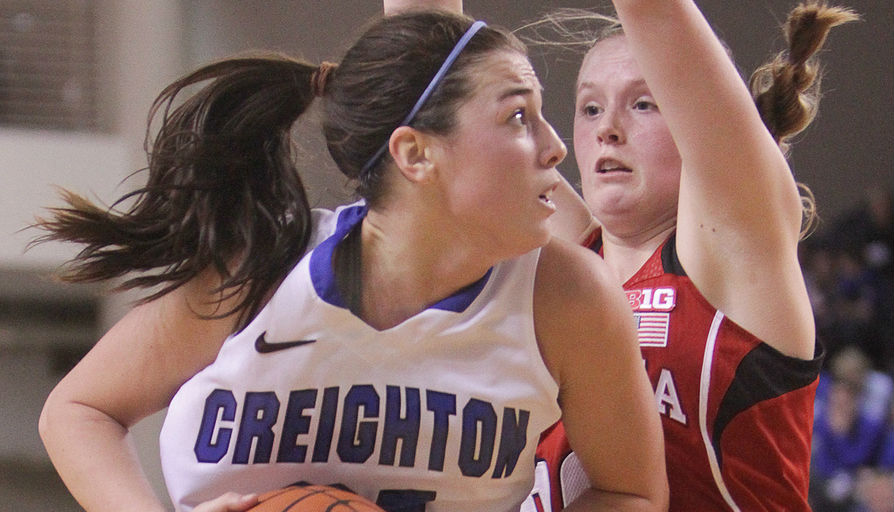Fans of the Creighton women’s basketball team may have noticed a familiar face in a different role on the Bluejay bench this season. That’s because former player Carli Tritz joined the Creighton coaching staff as a graduate assistant in the fall, jumping head first into the next phase of her basketball career. She’s traded her sneakers for high heels and often holds a clipboard instead of a basketball, but that the passion that made her a great player is still her key ingredient as a coach.
You have to turn the clocks back nearly 15 months ago to see the beginning of her transition from Carli the player to Coach Tritz. The night of Creighton’s first practice of the 2013-14 season, Tritz informed her teammates that she was retiring as a player, succumbing to the chronic knee pain that plagued her throughout her playing career. One day later, on October 1, 2013, she stood in front of a group of reporters at the old gym located on Creighton’s campus in the Joseph J. Vinardi Center and told them that her time in uniform had passed. She explained that she was at peace with the decision, understanding that all things have a beginning and an end, and it was no different for a basketball player.
“For athletes, no matter what sport you’re in, it always seems like the world at the time,” she said. “In a year from now none of you guys will be talking to me, and that’s okay. That’s the way it should be. You come four years, you leave, and you move on. That’s what I want. I want to be happily married, be a mother, and be able to do all of those things.”
At the time, she didn’t talk about coaching or joining the team in some capacity after graduation. But as her senior year went on, she slowly moved further from the “bench mob” and closer to the coaching staff. That enthusiasm for the game was proving to be stronger than the pain in her knee. And on senior night, the fans that had watched her score over 1,000 points and win 63 games in her first three seasons showed their appreciation for her efforts. Overcome with emotion during the moment, it made her realize the impact athletes can have on people, even after their playing days are over.
“It just made me realize just how strong of a connection I have to not just to my teammates, opposing players, fans, and all of the people I thanked, but to what sports can bring you emotionally,” Tritz said. “I don’t know how people can’t like sports, because you don’t get the same emotions anywhere else in life whether it’s the goosebumps, the adrenaline rush, or the sad, crying tears.
“On senior night when I was on the floor getting announced and the crowd stood up it showed people really appreciate how hard you work, and that the impact you make goes beyond your playing career. I feel like it’s the same way as a coach. Your impact goes beyond the player’s lives past just making a play for them, or telling them to cut backdoor. It just goes beyond that. Being emotional on senior night was just a little reminder of why I like sports so much in general, but obviously basketball, and how it can affect your character as a person when your four years are up.”
Her former head coach and current boss Jim Flanery said that Tritz was hinting at giving coaching a shot and was becoming more serious about that ambition as the season entered the winter months.
“I didn’t know until about midway through her senior year that she had an interest [in joining the staff],” Flanery said. “She’d mentioned it a little bit maybe before that, but it was probably last winter when she kind of hinted that she was serious about getting into coaching.”
Flanery added that it didn’t come as much of a surprise given the leadership Tritz displayed as a player. He said once she made the decision to retire and not play anymore, she looked grew more comfortable in her new role as someone her teammates could confide in off the court. “I give her a lot of credit. Obviously it wasn’t an easy decision and it wasn’t an easy role switch, but I think she had a really good perspective for someone who is 21-years-old and having to deal with that,” said Flanery.
“In some ways it was probably a less frustrating year for her than her junior season where she played through a lot of pain, and didn’t have the physical ability to do the things she had done the first two years. Once she made the decision she could kind of just focus on being a leader, and passing along good advice to young players and even to her classmates.”
Tritz said that staying at Creighton has made that transition easier because of the environment that exists not only with Flanery and his staff, but the other coaches and people in the athletic department inside The Wayne and Eileen Ryan Athletic Center. “Creighton is just a good place. Flan just has such good intentions when he wants to help people out, whether he wants a player to come play for him or a coach to help him out, or a manager or a [graduate assistant]. He wants me to figure out if I like it and hopes it’s a good start for my coaching career. He’s always a good reference to have for grad school stuff. He is just a good guy,” said Tritz.
“I feel like [Flanery] reflects a lot on what Creighton is about, too, especially the women’s basketball program. But I work across the hall from [Creighton volleyball coach Kirsten Bernthal Booth] and the soccer guys and soccer girls, and all of the coaches are here except for men’s basketball. I see them every day and I feel like it’s a culture that Creighton has.”
That culture is something that she helped to develop at Creighton. She came in as a freshman in 2010 and by the time she was giving her senior night speech her class had won 81 games over almost four full seasons, including a Missouri Valley Conference Tournament title in March of 2012, a shared regular season title a year later, and an NCAA Tournament first round win over Syracuse as an unofficial member of the re-aligned Big East Conference. But despite all of that, she says she has unfinished business dating back to her freshman season at Creighton that she still wants to see the Bluejays accomplish while she is still a part of the program.
“I remember saying this my very first day of freshman classes when this guy was interviewing me for the Omaha World-Herald and he asked me what are some of my concrete goals as a player, and I said, ‘I think we can make it to the Sweet 16, I really do.’ We had just lost a bunch of MVC Tournament championships, we were right there, really close, and I thought we could take it to the next step,” Tritz recalls saying at the time.
“I still feel like that is one of my goals. I feel like those are just as big of milestones for coaches as players, because of your whole resume as a coach. I think that’s a good place to start. I don’t want to say I want to be the next Geno Auriemma or Pat Summitt, because sometimes you have to work your way up or take a job to get a job, I know that’s the coaching business. But I think an attainable goal would be to get to the Sweet 16 or be a part of it as an assistant coach or as a head coach.”
One former teammate and current member of the Bluejays, junior guard Marissa Janning, not only shares the goal of getting Creighton to a Sweet 16, but also thinks Tritz was meant to have an impact on the game of basketball long after her playing days are over. “It’s kind of weird going from teammate to Coach Carli (laughs). But I think it’s good because she knows how it was from being a player,” Janning said.
“She has really good suggestions and she just has an eye for the game. She was basically a coach last year, and even the year before. She’s always been a leader, she’s a born coach. She’s so good at seeing things and being instructive about things. She’s been very helpful. I’m excited for games when she will have more of a voice. She’ll be a good voice to hear.”
If you ask Tritz what she hopes to accomplish as a coach, she’ll shoot for the stars with her answers. Sweet 16’s, national championships, etc. Something you’d expect a competitive person like her to say. But after you sift through all of that you’ll find the foundation for what she really wants to achieve. Something that her mom constantly asks of her, “If you weren’t an athlete, or a player, or a coach, would people still look up to you?'” Tritz said.
“She wants me to always ask myself that. So if I wasn’t a national championship coach or a Sweet 16 coach, would people still say the same things about me that I said about Flan? That’s really important to me to be a coach with integrity. One who has a program with integrity.”

